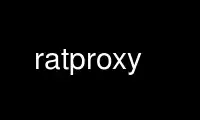
This is the command ratproxy that can be run in the OnWorks free hosting provider using one of our multiple free online workstations such as Ubuntu Online, Fedora Online, Windows online emulator or MAC OS online emulator
PROGRAM:
NAME
ratproxy - a passive web application security assessment tool
SYNOPSIS
ratproxy [-w logfile] [-v logdir] [-p port] [-d domain] [-P host:port]
[-xtifkgmjscael2XCr]
DESCRIPTION
Ratproxy is a semi-automated, largely passive web application security audit tool. It is
meant to complement active crawlers and manual proxies more commonly used for this task,
and is optimized specifically for an accurate and sensitive detection, and automatic
annotation, of potential problems and security-relevant design patterns based on the
observation of existing, user-initiated traffic in complex web 2.0 environments.
OPTIONS
-w logfile - write results to a specified file (default: stdout)
-v logdir - write HTTP traces to a specified directory (default: none)
-p port - listen on a custom TCP port (default: 8080)
-d domain - analyze requests to specified domains only (default: all)
-P host:port - use upstream proxy for all requests (format host:port)
-r - accept remote connections (default: 127.0.0.1 only)
-l - use response length, not checksum, for identity check
-2 - perform two, not one, page identity check
-e - perform pedantic caching headers checks
-x - log all XSS candidates
-t - log all directory traversal candidates
-i - log all PNG files served inline
-f - log all Flash applications for analysis (add -v to decompile)
-s - log all POST requests for analysis
-c - log all cookie setting URLs for analysis
-g - perform XSRF token checks on all GET requests
-j - report on risky Javascript constructions
-m - log all active content referenced across domains
-X - disruptively validate XSRF, XSS protections
-C - try to auto-correct persistent side effects of -X
-k - flag HTTP requests as bad (for HTTPS-only applications)
-a - indiscriminately report all visited URLs
EXAMPLES
Example settings suitable for most tests:
1) Low verbosity : -v <outdir> -w <outfile> -d <domain> -lfscm
2) High verbosity : -v <outdir> -w <outfile> -d <domain> -lextifscgjm
3) Active testing : -v <outdir> -w <outfile> -d <domain> -XClfscm
Multiple -d options are allowed. Consult the documentation for more.
Use ratproxy online using onworks.net services
